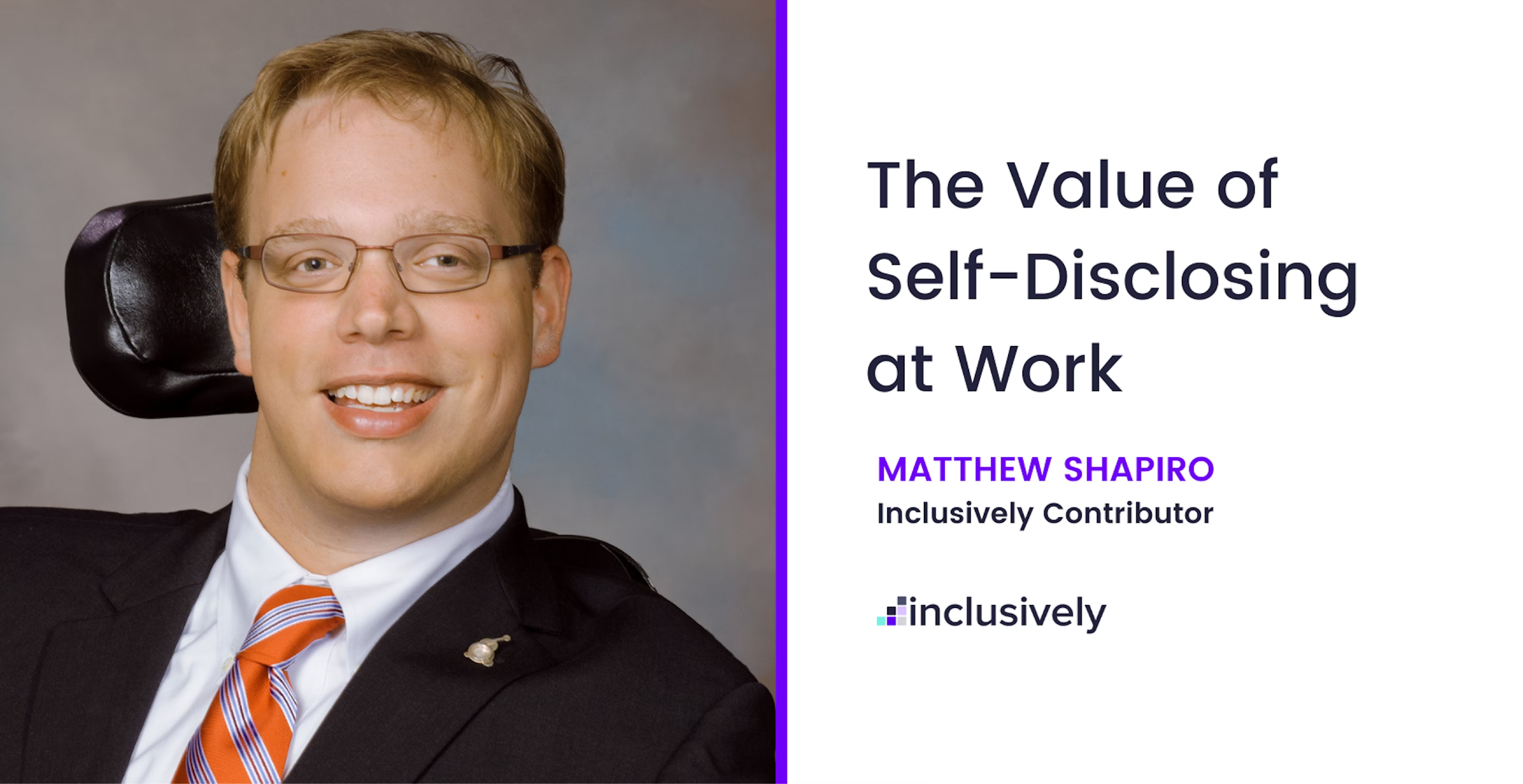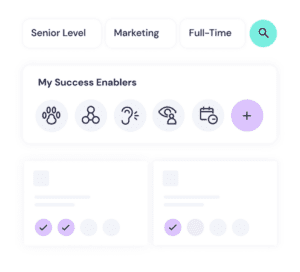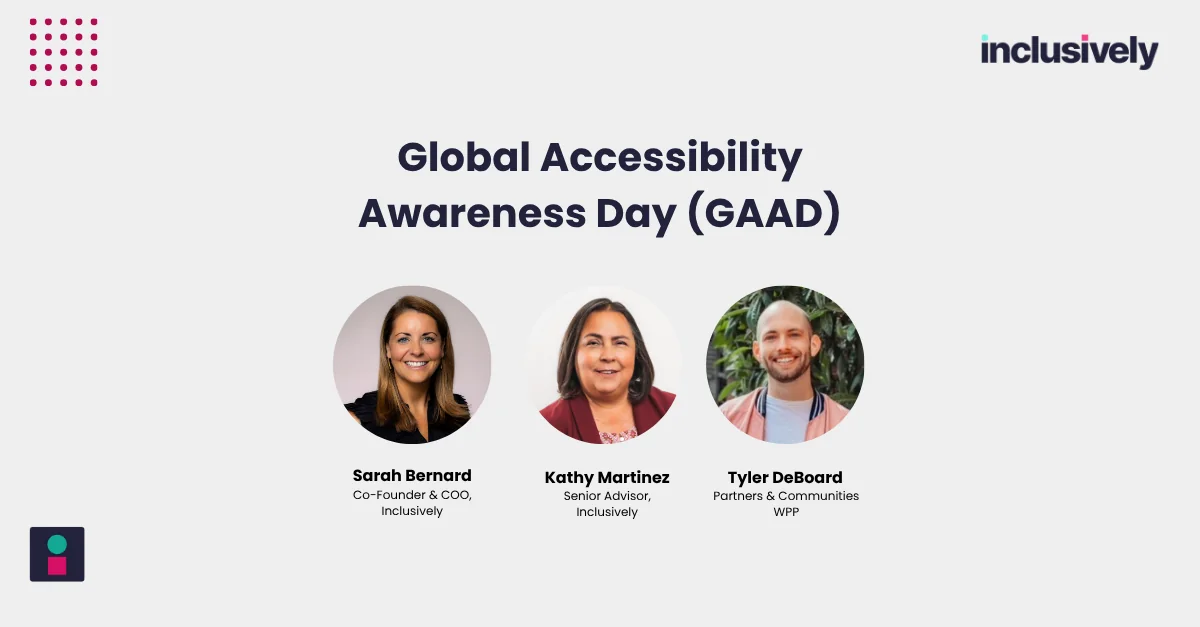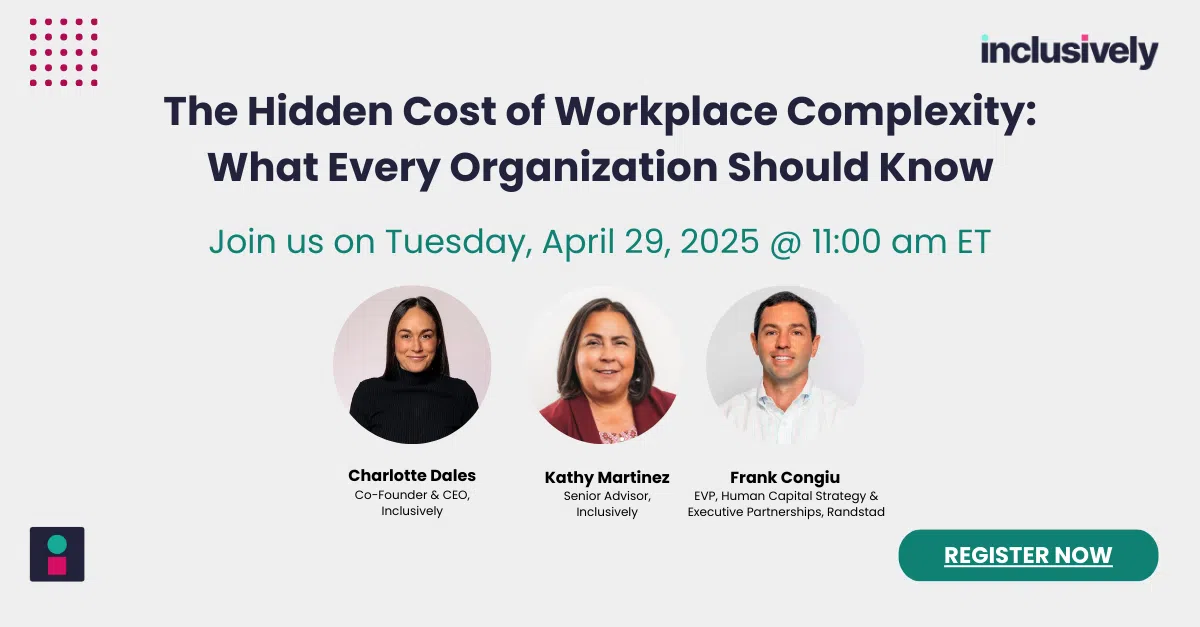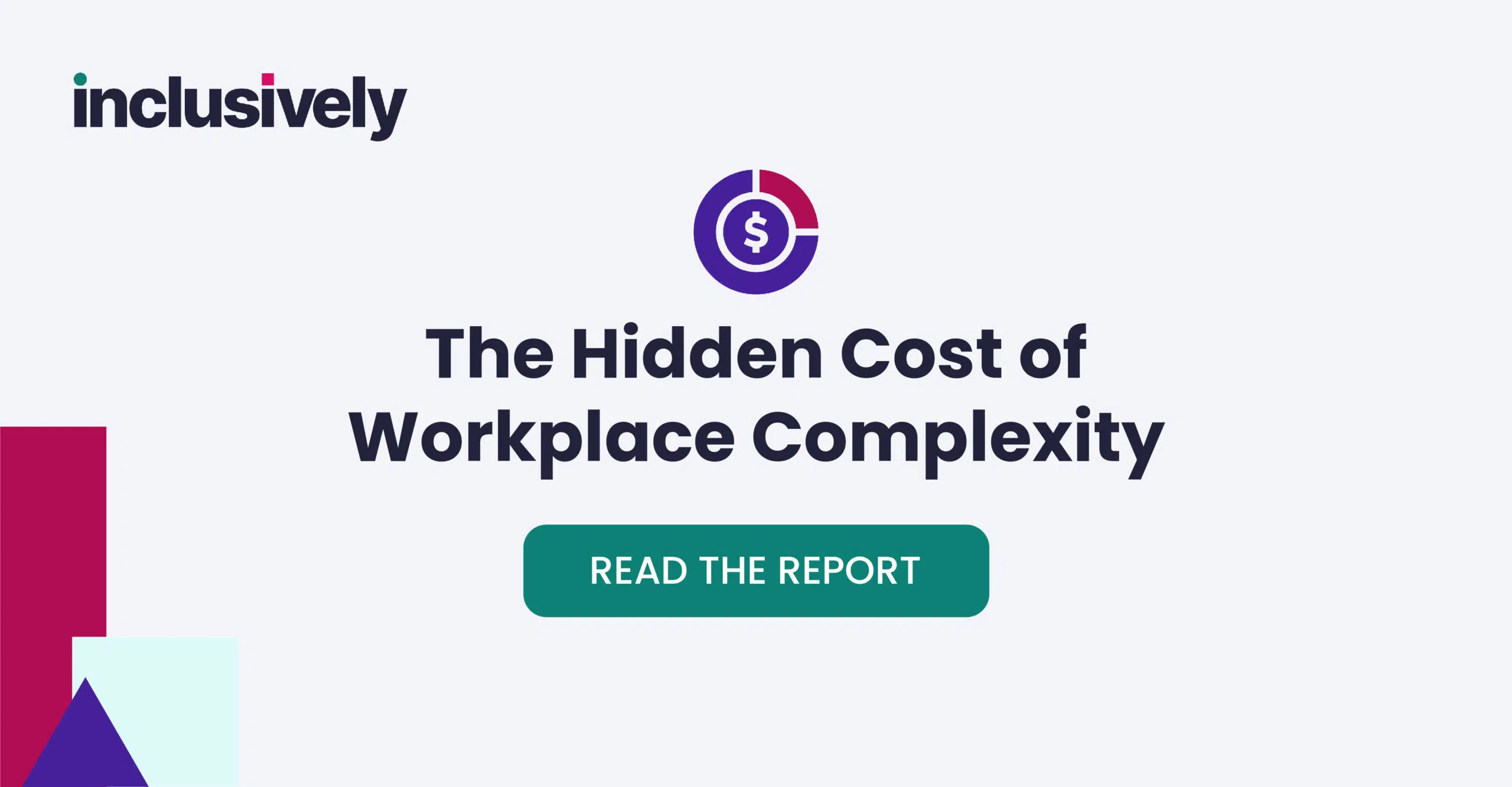Should you self-disclose? Matthew Shapiro, founder and CEO of 6 Wheels Consulting, shares his thoughts in a candid Q&A.
Why is self-disclosure important?
Self-disclosure varies based on each person. I’m a wheelchair user, which means that as soon as I roll into a room, you realize I have a disability. You may not know the specifics of what it is, but you know I have some challenges and, as a result, my approach to self-disclosure has always been to be very open, honest, and direct about it. I have found that things become a lot easier when you self-disclose, because disclosing allows you to have an honest dialogue with your employer. And, even though it can be harder to disclose if you are a person with an invisible disability—such as a learning disability—I would still argue in favor of disclosing because disclosing equals accommodations and accommodations equals leveling the playing field in the workplace.
What’s the right setting to disclose?
It is on businesses to set up a system where potential employees feel like they won’t be discriminated against in the workplace and to make it possible for employees to disclose in a setting in which they feel comfortable doing so. This might mean going into a one-on-one setting with a direct supervisor where the employee can say, “I am a person with disability. Here’s what my disability is. Here’s how it affects me. Here’s what I need in order to be successful in this workplace.”
We need to have a very truthful conversation that acknowledges that disclosing is scary and recognizes the importance of doing it right. To do so, we need to have systems in place in our businesses that allow people to be able to self-disclose more comfortably and without fear.
What can businesses do to facilitate that?
Primarily, setting up a strong culture that makes it clear people with disabilities are welcome. That starts from the top, with the leadership saying: we’re going to provide you a safe space to disclose. It’s going to be a judgment-free space where we’re going to have an open and honest conversation because, at the end of the day, it’s really a team effort. We all have to work together to make sure that everything is working smoothly. It must permeate all aspects of the corporate culture. Is the office space accessible so that everyone can have access to everything in the office space? Is disability represented in the marketing materials so that people see people that look like them? But it’s also about setting up a safe culture of acceptance where it’s clear that all people are valued.
The attitude from the employer should be: we hired you because we think you’re talented and we want to guarantee that you can be successful. And the way that we can guarantee that you’ll be successful is by providing you with reasonable accommodations in the workplace to help you achieve your job duties. And then have it be an ongoing conversation.
What advice can you give disabled job seekers on how to self-disclose with a new employer?
- Use Inclusively as a resource to help you link yourself as a potential employee to inclusive employers that are actively saying, we want people. Particularly if you have struggled in the traditional way of finding a job, using a resource like Inclusively can help you bridge the gap.
- Understand your strengths and weaknesses as an employee and understand how you can be successful. For example, I know I’m an auditory learner, so I need people to give me instructions verbally. And I know I have strong verbal skills and can thrive when put in front of an audience. On the other hand, I know I’m not the strongest at math and wouldn’t want to be in an office crunching numbers. If you understand those strengths and weaknesses before you go into an interview, you can use them to highlight yourself. It’s important for you to be comfortable in your own skin and be able to express what you can bring to a workplace and how you can be an asset.
- Know what accommodations you need to be successful. Hopefully you will have had experience using accommodations and you know what works. As the potential employee go into it knowing those things in detail so that when you have the accommodations conversation you are ready to go.
- Understand how your disability affects you individually. I always make the argument that if you’ve seen one person with CP—which is my disability—you’ve seen one person with CP. Each person is affected by their disability differently. Understand how your disability affects you so that you can disclose that to the potential employer.
- Just be honest and put your cards on the table. If you’re disclosing but you’re tiptoeing around it, you’re just not being fully transparent. Put it all on the table so that you have the best possible dialogue with your employer.
Overall, it’s about being transparent at every step. Understand how your disability affects you, understand the accommodations that you’re going to need to be successful and be completely open, clear, and honest from the jump.
What advice can you give to disabled employees on how to self-disclose with an employer?
You also need to have regular check-ins about your accommodations. How are your accommodations working? Are there other challenges that you’re having that you want to disclose? The process of disclosing is ever-evolving and ever-changing because people’s disabilities change and, as a result, people’s needs and accommodations change. You may develop new challenges that you’re going to have to disclose. Which is to say that the disclosure and accommodation process is fluid and should be a constant dialogue.
I’m not saying you need to have a weekly conversation about your accommodations, but maybe as part of your every six-month reviews or whatever it might be. Part of that conversation needs to be either, are your accommodations working the way that they’re supposed to work? Do you need new accommodations? You might also get new job duties and those new job duties might require new accommodations. And that dynamic starts with the disclosing conversation. If you don’t disclose, you’re not going to get any of those things. You can’t do one without the other, which is why it is vitally important that you disclose.
Are there other best practices from the point of view of the employer that we haven’t touched upon?
We just have to reframe this whole disclosure conversation. You’re not being treated differently because your playing field is being leveled. I understand the potential struggle, but that’s precisely why we have to flip the script on the stigma of disclosing. It’s not a bad thing to disclose. We just have to change the reaction that businesses have to disclosing. And we have to change the reaction that society has to disclosing.
The next question, then, is how do you do that?
- Set up a strong corporate culture where people with disabilities feel welcomed and have a solid system to disclose already in place through which people can disclose. Make it a confidential conversation in a private setting with the employee and the direct supervisor and make sure it’s a judgment-free zone.
- Have the people that need to know be the people that need to know. For example, to be successful, I need dragon naturally speaking, an adjustable desk to accommodate my wheelchair, and all my work requests in writing so that I have a record of what I am being asked to do. Yet not everyone in the office space needs to know the details of my accommodations.
- Set the stage that just because I get accommodations doesn’t mean I’m getting special treatment as an employee. You may have other employees wondering why I am getting all this technology. Well, I’m getting it because it’s going to help me do my job successfully.
- Set up a space where everyone can get accommodations if they need them. You don’t necessarily have to be a person with a disability to request an accommodation. You could be a person with a temporary disability and therefore temporarily require accommodations.
- And provide accommodations in a timely manner. The longer employees wait for their accommodations, the longer they’re continuing to be ineffective because they don’t have what they need to be successful.
How can the assurance of an inclusive employer change the self-disclosure conversation?
Clearly, if a business has made a commitment to be more inclusive and welcome people with disabilities into the workplace that’s setting up a strong corporate culture that would lead to the disclosure process being handled with care. You want people to be successful. So how do you help them be successful? You give them the accommodations they need to do that. It’s, in fact, in the business’s best interest to do that. If you have an employee that is not working to the best of their ability, there’s an element of your business that is falling by the wayside.
Overall, we have to change the way we think about disclosing. You need to be able to go into it knowing you can have an honest conversation about what accommodations you need. That way, you can hit the ground running with all the necessary systems in place. If businesses do some of the things that we have outlined, they’re going to make the disclosing process fairer and less stress-inducing, which is a great way to get a new employee to thrive in their new workplace.
Overview of a candidate’s job search indicators, including Senior Level, Marketing, Full-Time, My Success Enablers with a row of icons
How Inclusively Works
Inclusively’s accessible employment platform and job matching technology goes beyond traditional search criteria and allows candidates to connect with opportunities that match their experience, skills, and workplace accommodations – called Success Enablers. Some examples include screen readers, noise-canceling headphones, an emotional support animal, accessible parking and entrances, braille signage, and dozens more.
To connect and continue this conversation, join me on the new Inclusively Community Portal, created for their network of job seekers, employers, and partners to discuss disability employment topics, share ideas, and engage: https://community.inclusively.com/
About Matthew
Ever since I was a junior in high school, I’ve engaged in advocacy work to change people’s minds and thoughts about people with disabilities. Fast-forward to my career: I started 6 Wheels Consulting, LLC to do just that. We work with anybody in the community to assist them in expanding their understanding of disabilities and inclusion. One area of particular focus for me is acceptance in the workplace. I feel that everyone has skills, talents, and abilities that they can utilize to make an impact in the work world. It is on society to start recognizing the potential of the disability community as workplace contributors.
